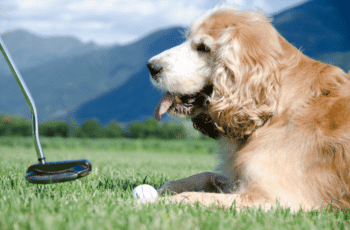Every dog owner has been there: it’s first thing in the morning, and you emerge, bleary-eyed and clutching a Stanley cup, feet shoved into the first pair of sneakers you could find. At the end of the lead is your four-legged family member, a much-loved companion (even if they are a little too enthusiastic for this hour).
As you make your way down the street, your pup pauses…sniffs…and cocks a leg, almost in slow motion. At the exact same moment, your neighbor emerges from their home, and you notice with mounting horror the ‘No Dog Waste’ sign at the edge of their (now soggy) lawn.
The above scenario poses a very important question for dog owners; can a ‘No Dog Pee/Poop’ sign on someone’s lawn actually be enforced? Are you breaking the law by allowing your dog to relieve themselves in that location, or is it merely impolite?
As a veterinary surgeon, I specialize in assessing the health of your dog’s urine and feces, but I want to acknowledge that I am not formally trained on legal matters. Therefore, while I can advise on your pet’s health, I cannot definitively comment on local law violations.
Let’s take a deep dive into whether or not ‘No Dog Pee/Poop’ signs on lawns can be enforced.
The Relevance of Local Ordinances
The enforceability of “No Dog Pee/Poop” signs on someone’s lawn depends on local ordinances. An ordinance is basically a local law, and is legally binding.
Ordinances are backed by formal legislative acts passed by the local governing body. They only apply within the boundaries of the specific municipality or county that enacted them. Ordinances often address specific areas such as:
● Parking regulations
● Property maintenance standards
● Business licensing requirements
● Waste management and recycling
Ordinances are legally binding and are enforceable by local authorities. Police departments or animal control officers may be able to take action in the case of a violation, and such actions could result in fines, penalties, or other legal consequences[3].
In many situations, local ordinances will require pet owners to clean up after their dogs, and some may even include provisions about dogs urinating on private property. Check with your local government or municipality for specific regulations that apply in your area…ideally before you leave the house!
Is it Trespassing to Ignore ‘No Dog Pee/Poop’ Signs on Someone’s Lawn?
A dog peeing on someone’s lawn is a nuanced issue and violations depend on local laws. As a responsible dog owner, it’s critical to know what local ordinances apply in your area. Some areas may actually classify repeat dog-peeing-on-lawn incidents as trespassing.
For example, in Reedley, California, there is an ordinance stating, “Any animal, including, but not limited to, dogs, found trespassing on private property may be taken up and detained by the owner of the private property and turned over to the poundmaster to be disposed of as provided by law”. (Ord. 2009-04, 9-22-2009)” [1]. Terrifying!
Generally, trespassing involves entering someone’s property without permission and it usually applies to people. It’s less common (but not impossible) for the definition of trespassing to be extended to pets under the owners control.
If a dog’s behavior (including relieving themselves in unwanted locations) is causing damage,, the property owner may be able to take action through nuisance laws. While the sign itself doesn’t create a legal prohibition, it can support the owner’s case if they decide to take action. This is because having a yard sign is a clear indication to visitors of the property owner’s preference.
Does My Dog Peeing or Pooping on Someone’s Lawn Constitute Damage to Private Property?
Local ordinances and specific circumstances surrounding an incident will be taken into account when the law determines if there is damage to private property. As we mentioned, some cities and towns have specific ordinances that require pet owners to clean up after their dogs. As a dog owner it’s sensible to make sure you’re clued up in advance on the rules that apply where you live.
In Manchester, New Hampshire, it’s a violation to fail to remove and dispose of your dog’s feces, and it’s even a violation to fail to carry poop bags while walking your dog! The only exception is if you are mentally or physically impaired and are unable to comply with this ordinance [2].
Dog Waste is Hazardous
Dog feces is not only unsightly but extremely unhygienic and a potential health hazard to residents. Dog urine is high in nitrogen, and can damage grass and plants over time.
See also

When dogs pee repeatedly, brown spots and dead patches on the lawn may result, which could potentially be considered property damage.
In some jurisdictions, if a dog causes significant damage to someone else’s property, the owner could be held liable for the cost of repairs.
Practical Steps for Dog Owners
It’s impossible to be completely in control of when and where your dog relieves themselves.But part of being a responsible pup parent is doing your best to control where your dog uses the bathroom. Remember to keep your dog on a leash and guide them away from marked areas and personal property
Always carry poop bags to pick up any solid waste and dispose of it in an appropriate trash unit. Consider carrying a bottle of water to dilute and flush away urine if your dog does inadvertently pee on a private lawn with a ‘No Dog Waste’ sign.
While a single urination incident may not result in legal consequences, repeated behavior, especially in the presence of a “No Dog Pee/Poop” sign, can escalate the situation. Many homeowners have cameras on their home’s exterior and could further provide evidence on the owner’s behalf in the case of an incident.
Research local ordinances ahead of time and guide dogs to appropriate areas for their elimination needs. Plus, it’s the polite thing to do and you would want somebody to respect your property as well. Happy travels, and may your pocket full of poop bags never run empty.
Written By Dr. Daisy May MRCVS BVSc, Veterinary Surgeon



